Ulm, Germany, July 12, 2024 - Scantinel, a global leader in LiDAR (Light Detection and Ranging) sensor technology, appoints Frank Lindenberg as Chairman of the Advisory Board.
With Zeiss Ventures, Scania Growth Capital, and PhotonVenture already supporting the company, Scantinel now has the backing of another prominent figure in the automotive industry. Frank Lindenberg, who was a member of the Board of Management of Mercedes-Benz AG as CFO and Head of Corporate Strategy, has joined Scantinel.
Previously, he served as CFO of Daimler Trucks and held various management positions across multiple business units and central functions within the Daimler Group. Since leaving Mercedes-Benz in 2020, Lindenberg has been active as a consultant and investor in startups and venture capital. He also served on the Board of Directors of the American electric car manufacturer Lucid (Nasdaq) from 2021 to 2023.

Frank Lindenberg: Experienced Top Manager from the Automotive Industry with Close Investor Contacts
Frank Lindenberg brings over 30 years of experience in the automotive industry. Combined with his insights into startups and venture capital, and his proven expertise in strategy and business development, he is the perfect Chairman of the Advisory Board for Scantinel given the current situation and challenges.
"We are very pleased and proud to have Frank Lindenberg on board. We now have a true insider among us whose expertise we will greatly benefit from."
- Andy Zott, CTO and Co-Founder of Scantinel.
"The appointment of Frank Lindenberg as Chairman of the Advisory Board marks an important milestone for our company. We are confident that his strategic vision and industry expertise will lead us into the next phase of our growth and success."
- Dr. Michael Richter, CEO of Scantinel.
"The globally unique SingleChip FMCW LiDAR technology from Scantinel immediately convinced me. It offers great potential for use in the automotive industry and beyond. I look forward to contributing my experience and contacts to guide Scantinel into the next phase of its corporate development."
- Frank Lindenberg, Chairman of the Advisory Board of Scantinel.
About Scantinel Photonics GmbH
Founded in 2019 and based in Ulm, Germany, Scantinel Photonics GmbH is a leading FMCW LiDAR company developing LiDAR technology for autonomous vehicles and robotics. Scantinel is supported by ZEISS Ventures, Scania Growth Capital, and Photon Ventures. For more information, visit www.scantinel.com.
Ulm, Germany, July 9, 2024 - Scantinel, a global leader in LiDAR (Light Detection and Ranging) sensor technology, reinforces its leading position in the high integration of photonic integrated circuits (PICs) with the introduction of its next generation Photonic Single Chip based on standard CMOS technology.
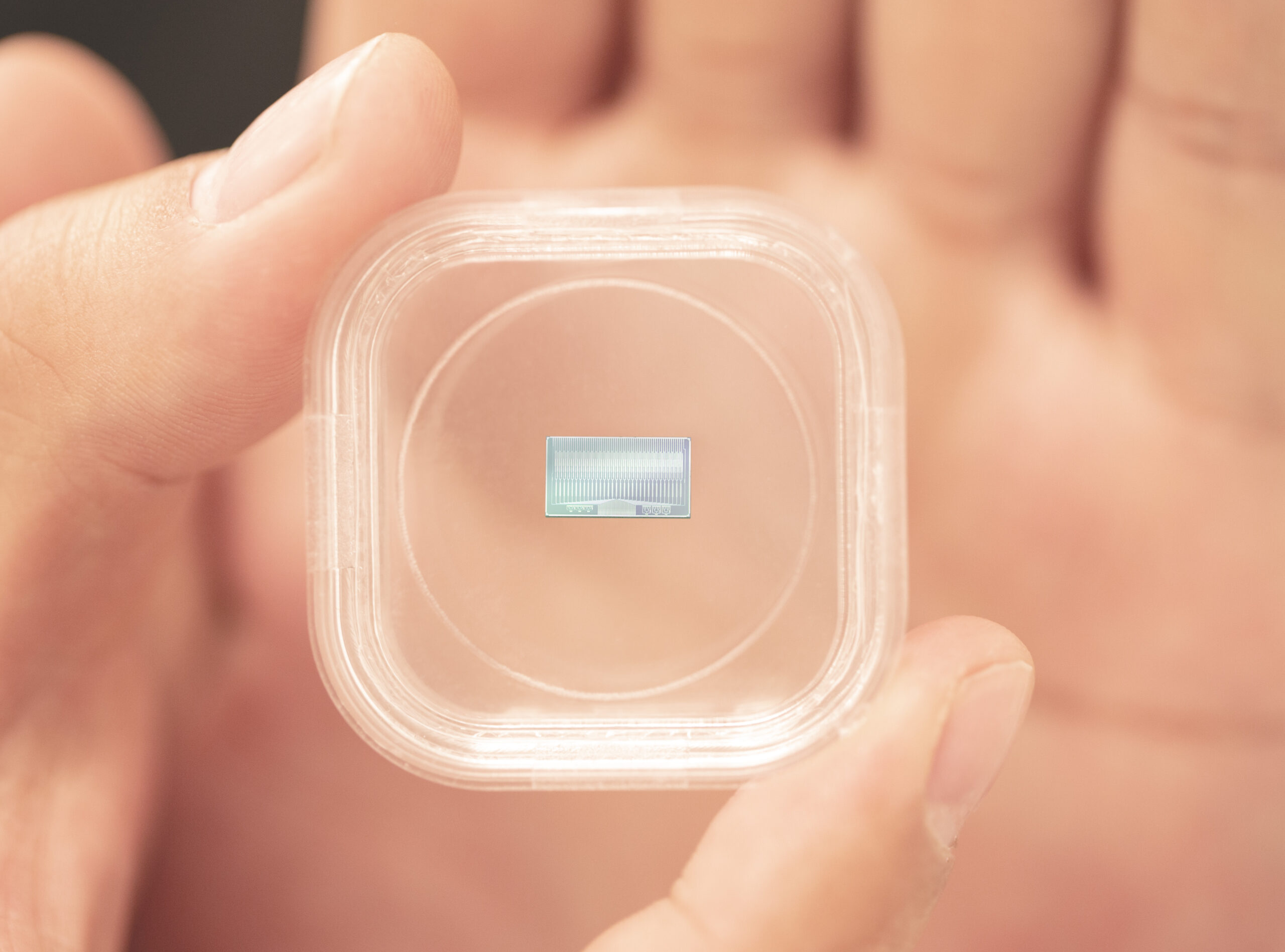
The next-generation PIC feature a fully integrated, massively parallel detector system for coherent LiDAR. The recently fabricated photonic chip, which includes both a scanner and detector system on a single chip, was successfully tested at Scantinel. It demonstrated a significant per-pixel improvement in signal-to-noise ratio of about 20dB compared to previous solid-state LiDAR scanners.
This scanner-detector chip is a fully integrated, automotive-ready device that serves for automotive LiDAR Samples. The Sample includes a photonic chip and a low-noise electronics board. Due to the SNR (Signal-to-Noise Ratio) improvements, the system has achieved a tenfold reduction in LiDAR power consumption, paving the way for faster pixel rates. Compared to market systems using proprietary technology or two-mirror scanners, this generation features a solid-state scanning and fully leverages the advantages of FMCW technology over existing Time of Light (TOF) LiDAR systems.
The PIC production is fully transferred to high-volume standard CMOS fabrication, indicating the advanced maturity of the technology being developed.
"We believe in the efficient integration of proven technology building blocks using CMOS fabrication in combination with hybrid-packaging processes to enable highly reliable single-chip photonic LiDAR sensors for the automotive market. Additionally, Scantinel's integrated FMCW laser technology showcases a 10kHz linewidth and 10dBm in-waveguide power, which are critical parameters for an integrated optical amplification system."
- Vladimir Davydenko, Chief Scientist and Co-Founder of Scantinel.
“With this new PIC generation, we are underlining our worldwide leading position in highly parallelized FMCW Photonic Single Chip LiDAR based on standard CMOS. The new samples will be available for customers in Q4 2024."
- Dr. Michael Richter, CEO of Scantinel.
About Scantinel Photonics GmbH
Founded in 2019 and based in Ulm, Germany, Scantinel Photonics GmbH is a leading FMCW LiDAR company developing LiDAR technology for autonomous vehicles and robotics. Scantinel is supported by ZEISS Ventures, Scania Growth Capital, and Photon Ventures. For more information, visit www.scantinel.com.
Ulm, Germany, July 03, 2023 – Scantinel Photonics GmbH, a globally leading FMCW LiDAR company, has unveiled the second generation of its chip-scale massively parallelized photonic integrated circuit (PIC). This remarkable achievement propels Scantinel closer to its ultimate goal of developing a "Single Chip LiDAR" solution. The photonic chip offers an exceptional combination of high pixel rate and high signal-to-noise ratio, enabling the capture of outstanding high-quality real-life data. This advancement is made possible by the chip's unparalleled level of integration, setting it apart in the world of LiDAR technology and paving the way for the realization of autonomous driving.
Scantinel Photonics demonstrates integrated, massively parallelized detector and scanning chip sharing the same photonic platform as our integrated laser
Vladimir Davydenko, Co-Founder of Scantinel Photonics
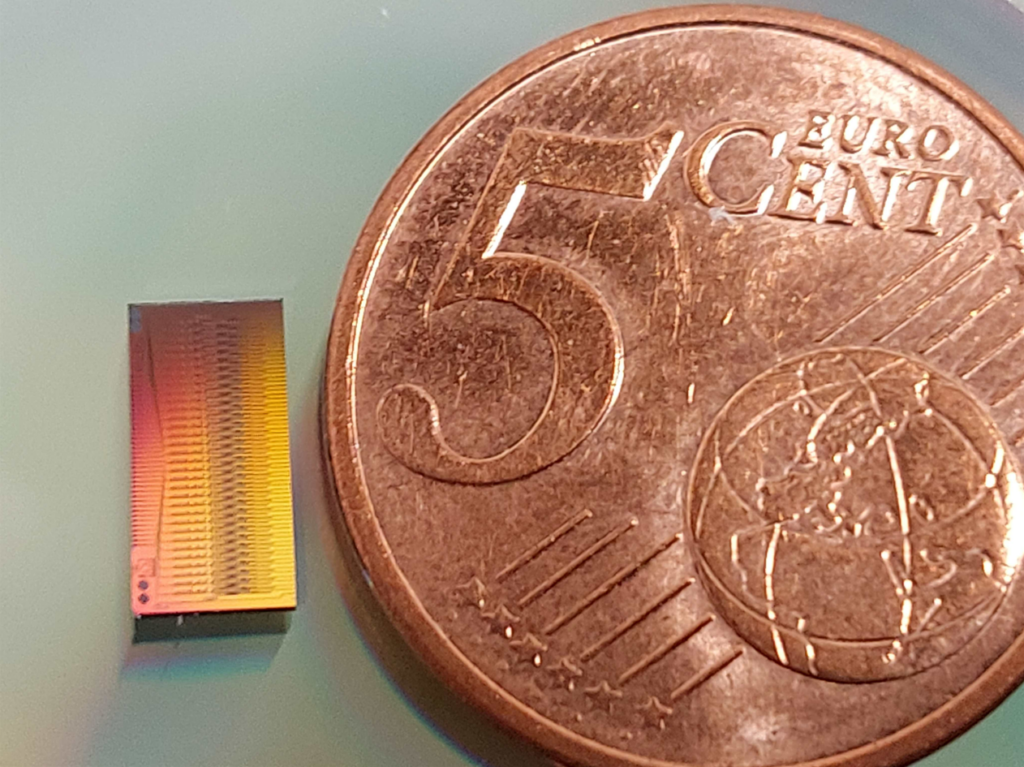
“Automotive solid-state scanning LiDAR requires the co-integration of detectors, laser and ultra-low loss solid state scanner on the same CMOS-foundry compatible photonic platform. Scantinel Photonics GmbH demonstrates integrated, massively parallelized detector and scanning chip sharing the same photonic platform as our integrated laser” said Vladimir Davydenko, co-founder of Scantinel.
“The new PIC architecture allows further a full in system calibration leading to significant cost reduction in a volume production environment as it reduces machine investments, fab area and production times” said Andy Zott, Managing director and co-founders of Scantinel.
“This high integration into a single chip LiDAR gives a significant advantage in cost and size over any existing solutions” adds Dr. Michael Richter – Managing Director of Scantinel Photonics.
The launch of Scantinel Photonics' second-generation PIC represents a significant leap forward in its pursuit of a cost-effective and compact LiDAR solution for autonomous driving applications.
Founded in 2019 and based in Ulm, Germany, Scantinel Photonics GmbH is a leading FMCW sensing technology company offering next-generation LiDAR solutions for mobility and industrial applications. Scantinel is backed by ZEISS Ventures, Scania Growth Capital and PhotonDelta. For more information, visit www.scantinel.com
Ulm, Germany, June 23, 2023 Recognition at the German SME Summit: Ranga Yogeshwar congratulates Scantinel Photonics GmbH from Ulm on being awarded the TOP 100 seal. The award ceremony as part of the summit took place on Friday, June 23, in Augsburg for all medium-sized companies that received the TOP 100 seal at the beginning of the year. The science journalist oversees the innovation competition as a mentor, which is being held for the 30th time. In the scientific selection process, Scantinel Photonics impressed in size class A (up to 50 employees) in all innovation categories and came second in its class.
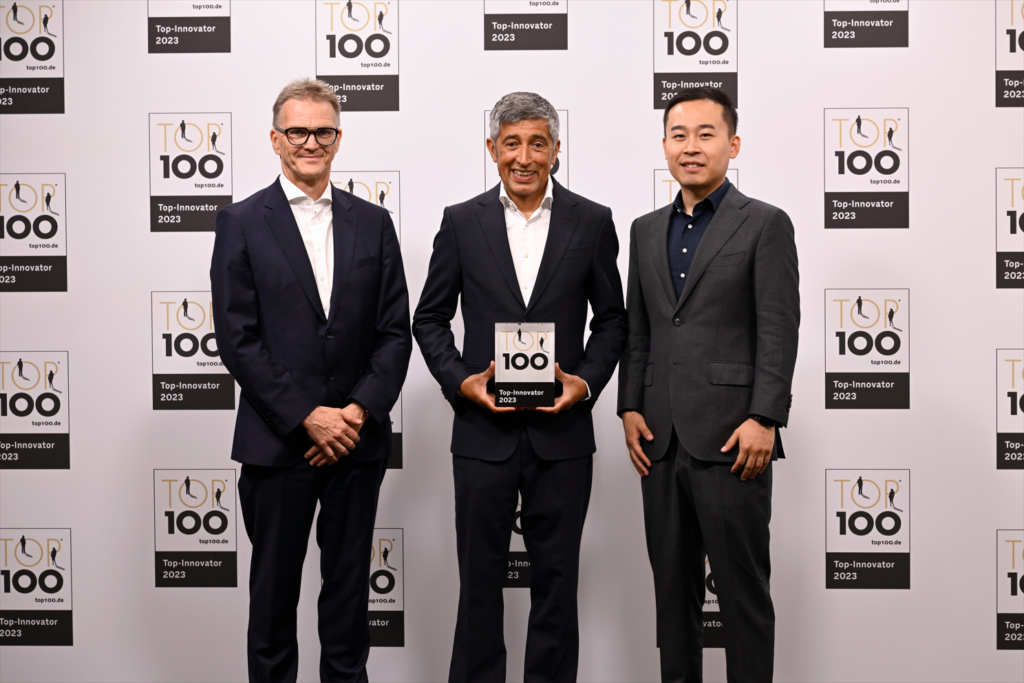
In the foreseeable future, cars and trucks will be fully autonomous. To achieve this, they have to be aware of the surrounding environment on the road and master all traffic scenarios - in Germany and around the world. The FMCW LiDAR technology company Scantinel Photonics make a decisive contribution to this: high-performance frequency modulated continuous wave light detection and ranging sensors – in short: FMCW LiDAR – are able to optically measure distances and speeds. When developing the new LiDAR sensors, the top innovator relies on "Frequency Modulated Continuous Wave" technology. Special optical components for processing light pulses are applied to a silicon chip. Scantinel ranks among the top tier worldwide for patents in the photonics sector, especially in the automotive application.
Globally there are only a handful of companies that develop FMCW LiDAR technology and we are the only one in Germany. So far, no one else has succeeded in building a comparable powerful photonic chip.
Dr. Michael Richter, Managing Director of Scantinel Photonics
The complete portrait is available here: www.top100.de/die-top-innovatoren.
Since 1993, compamedia has been awarding the TOP 100 Award for special innovative strength and leading innovative success to medium-sized companies. The scientific management has been in the hands of Prof. Dr. Nicholas Franke. Franke is the founder and head of the Institute for Entrepreneurship and Innovation at the Vienna University of Economics and Business. With 26 research awards and over 200 publications, he is one of the leading innovation researchers internationally. TOP 100's mentor is science journalist Ranga Yogeshwar. Project partners are the Fraunhofer Society for the Promotion of Applied Research and the BVMW association of medium-sized companies. The magazines manager magazin, impulse and ZEIT für Unternehmer accompany the company comparison as media partners. More information and registration at www.top100.de.
Founded in 2019 and based in Ulm, Germany, Scantinel Photonics GmbH is a leading FMCW sensing technology company offering next-generation LiDAR solutions for automated mobility and industrial applications. Scantinel is backed by ZEISS Ventures, Scania Growth Capital and PhotonDelta.
Ulm, Germany, June 06, 2023: Scantinel Photonics GmbH is developing Photonic Integrated Circuit (PIC) based FMCW (Frequency Modulated Continuous Wave) LiDAR. PICs are a transformative technology that demonstrates unparalleled opportunities for size and cost reduction as well as mass production scalability. Silicon photonics offers a whole new level of system integration and will bring solid-state FMCW LiDAR on CHIP to reality.
The MoveSG Accelerator program, helmed by Goldbell, offers Scantinel Photonics valuable access to innovators, investors, institutions, and leading global and regional transport and mobility corporate partners in Asia-Pacific.
LiDAR is considered the enabling technology for safe automated mobility and emerging industrial applications such as smart infrastructure and mining. Scantinel offers a unique FMCW LiDAR solution with its flexible approach to make automated mobility a reality. This new technology delivers a detection range beyond 300 m with the superior resolution based on a high level of integration on silicon photonics, solid-state scanning, and competitive pricing, which are the key factors for mass deployment in the mobility and industrial sectors.
We look forward to working closely with Scantinel Photonics GmbH and providing them with potential opportunities to pilot their ideas in Singapore and beyond with various corporate partners, ultimately growing them into the next giants in mobility.
Leong Wye Houn, (GBIH) Director, Future Mobility
We see great value in being part of the Goldbell Accelerator program and we are looking forward to the collaborations and benefits by working closely with Goldbell and MoveSG’s leading partners.
Dr. Michael Richter, Managing Director, Scantinel
Founded in 2019 and based in Ulm, Germany, Scantinel Photonics GmbH is a leading FMCW sensing technology company offering next-generation LiDAR solutions for mobility and industrial applications. Scantinel is backed by ZEISS Ventures, Scania Growth Capital and PhotonDelta. For more information, visit www.scantinel.com
MoveSG is a global acceleration programme open for companies and entrepreneurs across the globe in Singapore, and has supported about 70 early-stage startups. MoveSG is helmed by Goldbell – Singapore’s largest player in leasing and distribution of commercial and industrial vehicles – and located in the strategic and global technology hub of Singapore with the support of key industry partners such as TotalEnergies, Shell, Avis Budget Group, ComfortDelGro Ventures, Continental, SMRT, Airmaker (Subsidiary of Capitaland), Alstom, Singtel, Stanley Black & Decker, Thyssenkrupp, Bosch, PSA UnboXed and Enterprise Singapore. The accelerator programme is dedicated to piloting and nurturing cutting-edge technology solutions in the fields of mobility, transport and logistics, to drive tangible impact and positive change to real problems in the Asia-Pacific. For more information, visit www.movesg.io
Ulm, Germany, February 01, 2023: Scantinel Photonics, a global leading FMCW LiDAR technology company, has received the Top 100 Innovator Award in Germany. On June 23, science journalist Ranga Yogeshwar will personally congratulate Scantinel on this success at the awards ceremony in Augsburg. Yogeshwar serves the TOP 100 innovation competition as a mentor.
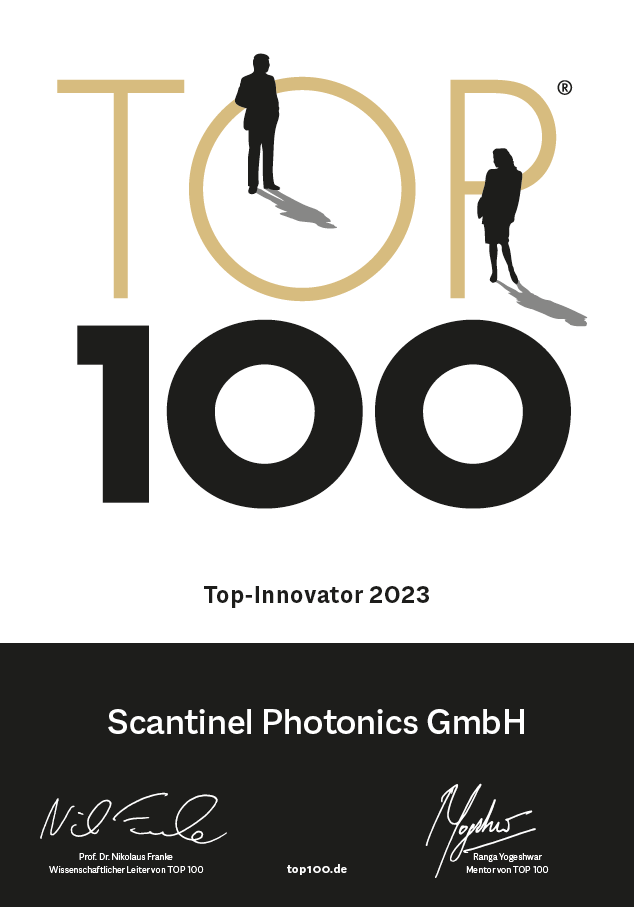
The competition is based on a scientific selection process. On behalf of compamedia, the organizer of the competition, the innovation researcher Prof. Dr. Nikolaus Franke from the Vienna University of Economics and his team has analyzed Scantinel based on more than 100 criteria from five categories: innovation-promoting top management, innovation climate, innovative process and organization, external orientation/open innovation and innovation success. It is particularly important whether a company's innovations are just a product of chance or whether they are planned systematically and can therefore be repeated in the future (further information on the test criteria at https://www.top100.de/teilnahme/pruefkriterien/).
Scantinel is recognized as one of the very top innovators in 2023. Located in Ulm and Karlsruhe, Germany, Scantinel has made a name for itself by leading innovative FMCW LiDAR sensing technology, standing on the front line to bring FMCW LiDAR on PIC into market. The company is currently developing a revolutionary SingleChip LiDAR solution based on a photonic platform with groundbreaking solid-state scanning capability. Such approach yields a highly integrated system with tremendous scalability potential, which can be easily adapted to any application eco-systems.
SingleChip LiDAR solution will be the dream come true for the mobility industry, and it requires significant innovations on photonic, laser, optic, packaging, system integration, etc. At Scantinel, we are pioneering in all these aspects and are pushing the limits of next generation FMCW LiDAR sensing. The Top 100 Innovator Award is a great recognition of our technology-leading position and innovation-driven culture.
Dr. Michael Richter, Managing Director of Scantinel Photonics
The TOP 100 is about the question of how important the innovation goal is in the company. Do routines and habits dominate, or is the company able to question the existing, to think creatively and anew, and to successfully assert itself on the market? We analyze this ability based on more than 100 test criteria.
Prof. Dr. Nikolaus Franke, Scientific Director of Top 100 Innovator Competition
On June 23, all top innovators of the 2023 class will come together in Augsburg for the award ceremony at the German SME Summit. There Ranga Yogeshwar will personally congratulate them on their success in TOP 100.
Since 1993, compamedia has been awarding the TOP 100 Award for special innovative strength and leading innovative success to medium-sized companies. The scientific management has been in the hands of Prof. Dr. Nicholas Franke. Franke is the founder and head of the Institute for Entrepreneurship and Innovation at the Vienna University of Economics and Business. With 26 research awards and over 200 publications, he is one of the leading innovation researchers internationally. TOP 100's mentor is science journalist Ranga Yogeshwar. Project partners are the Fraunhofer Society for the Promotion of Applied Research and the BVMW association of medium-sized companies. The magazines manager magazin, impulse and ZEIT für Unternehmer accompany the company comparison as media partners. More information and registration at www.top100.de.
Founded in 2019 and based in Ulm, Germany, Scantinel Photonics GmbH is a leading FMCW sensing technology company offering next-generation LiDAR solutions for automated mobility and industrial applications. Scantinel is backed by ZEISS Ventures, Scania Growth Capital and PhotonDelta.
Ulm and Karlsruhe, Germany; 24th November 2022: Scantinel Photonics, a startup developing nextgen LiDAR solutions for mobility and industrial applications, has secured a €10 million extended Series A. The round was backed by PhotonDelta and current investors Scania Growth Capital and ZEISS Ventures.
Scantinel will use the funding to roll out its Frequency Modulated Continuous Wave (FMCW) LiDAR devices to customers.
LiDAR has more accuracy and precision in detecting objects and mapping than other solutions such as RADAR and RGB cameras. It is also more immune to interference. This makes it ideal for enabling autonomous driving, as well as within logistics - such as conveyor belts and autonomous cranes. However, LiDAR devices have previously been too large, expensive or difficult to produce to be practical alternatives.
By using photonic chips, which use light instead of electrons to transfer information in microchips, Scantinel has developed its groundbreaking FMCW LiDAR solution which has the power, affordability and mass production scalability to enable LiDAR to have broad application across industry and mobility. The technology delivers a detection range beyond 300m with superior resolution and solid-state scanning. Scantinel has signed a number of partnerships with major global automotive, mobility and industrial companies.
The investment by PhotonDelta marks another step in its mission to build a European photonics ecosystem. In April PhotonDelta secured €1.1 billion in public and private investment to scale up production, build 200 startups, create new applications for photonic chips and develop infrastructure and talent.
Andy Zott, Managing Director and Co-founder of Scantinel, said: “We see a great value having PhotonDelta as an additional investor and we are looking forward to maximizing the collaborations and benefits from PhotonDelta’s leading integrated photonics ecosystem.”
Ewit Roos, CEO of PhotonDelta, said: “Photonic chips are a next generation chip technology which will bring new innovations like FMCW LiDAR on CHIP to life and we are excited to ride along this journey with Scantinel. We see the investment in Scantinel as a perfect fit to grow and strengthen our photonics ecosystem.”
Dr. Michael Richter, Managing Director of Scantinel, said: “The investments from our existing investors ZEISS Ventures and Scania Growth Capital, along with our new investor PhotonDelta will accelerate our product development together with our customers and partners.”
Founded in 2019 and based in Ulm, Germany, Scantinel Photonics GmbH is a leading FMCW sensing technology company offering next-generation LiDAR solutions for autonomous mobility. Scantinel is backed by ZEISS Ventures, Scania Growth Capital and PhotonDelta.
PhotonDelta is an ecosystem that researches, designs, develops, and manufactures solutions with integrated photonics technology. Connecting pioneers in the field with investors, and viable markets, PhotonDelta helps to take the industry forward with funding, investments and R&D roadmaps. PhotonDelta is located in the Netherlands but connects and collaborates throughout Europe. www.photondelta.com
Enjoy reading the latest article from us below:
www.laserfocusworld.com/optics/article/14282166/
photonic-integrated-circuits-pave-the-way-for-autonomous-mobility
Ulm, Germany, August 19, 2022 – Scantinel Photonics, leading FMCW sensing technology company in Ulm, Germany announced today that its Photonic Integrated FMCW LiDAR Sensing Module was recognized among the best by the 2022 Laser Focus World Innovators Awards. An esteemed and experienced panel of judges from the optics and photonics community recognized Scantinel Photonics as a Platinum honoree, the highest level to recognizes a superb innovation.
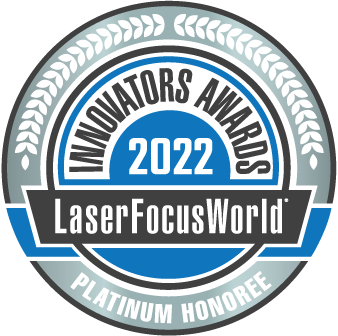
On behalf of the Laser Focus World Innovators Awards, I would like to congratulate Scantinel Photonics on their Platinum honoree. This competitive program allows Laser Focus World to celebrate and recognize the most innovative products impacting the photonics community this year.
Peter Fretty, Editor-in-Chief, Laser Focus Word
Scantinel Photonics is devoted in the development of next-generation solid-state FMCW sensing, focusing on using its proprietary FMCW technology to provide new dimensions of data information, and is committed to applying FMCW LiDAR distance and velocity measurement technology to autonomous mobility applications.
Scantinel’s FMCW sensing approach adopts a wavelength of 1550 nanometers (meeting high standards for human eye safety), is equipped with a solid-state Optical Enhanced Array (OEA™) scanning system and provides a detection range of more than 300 meters at a very competitive cost target.
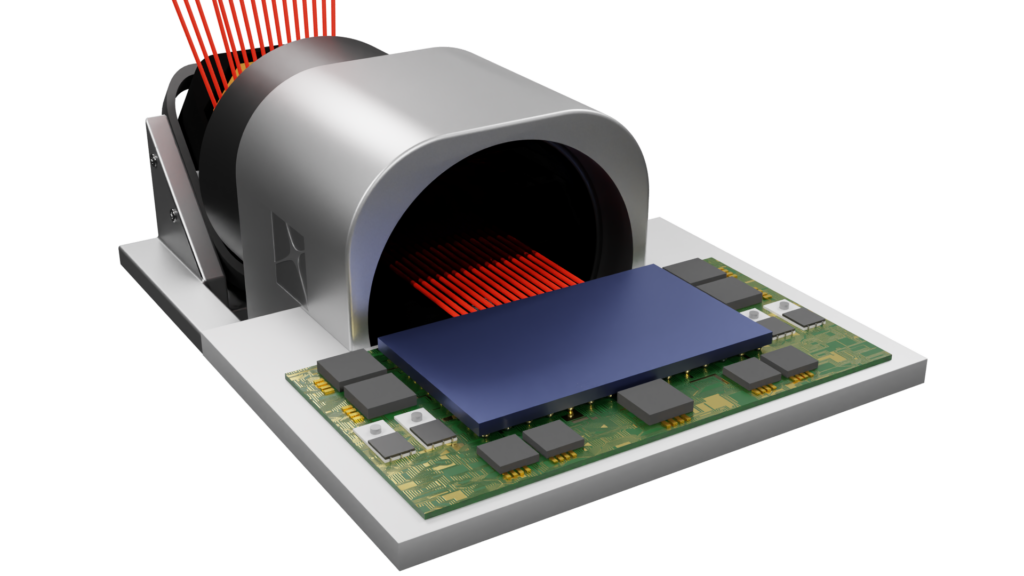
Scantinel’s FMCW LiDAR technology offers significant benefits over legacy ToF LiDAR:
2022 Innovators Awards: Meet the winners
Published since 1965, Laser Focus World has become the most trusted global resource for engineers, researchers, scientists, and technical professionals by providing comprehensive coverage of photonics technologies, applications, and markets. Laser Focus World reports on and analyzes the latest developments and significant trends in both the technology and business of photonics worldwide — and offers greater technical depth than any other publication in the field.
Founded in 2019 and based in Ulm, Germany, Scantinel Photonics GmbH is a leading FMCW sensing technology company offering next-generation LiDAR solutions for autonomous mobility. Scantinel is backed by ZEISS Ventures and Scania Growth Capital.
Scantinel was invited by CIIPA (China International Investment Promotion Agency - Germany) and presented “Next Generation Photonic Integrated FMCW Sensing Technology” by Dr. Michael Richter - Managing Director of Scantinel at CAR Symposium Bochum on 01.06.2022.
You can find the press coverage from CIIPA below (in German).